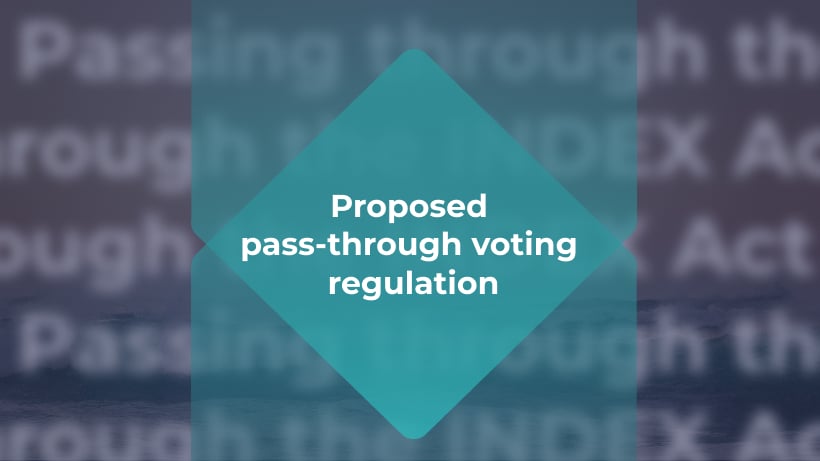Proposed INDEX Act calls for pass-through voting

Written by Will Goodwin, co-founder, Tumelo.
Background
The “Big Three” fund managers (BlackRock, Vanguard and State Street) cast about 24.9% of the votes at companies listed on the S&P 500. And influence isn’t limited to the prominent players within the fund-management space; the sway of any fund manager grows with their assets.
However, these fund managers often have different incentives than those of the people or institutions whose money they manage. For example, daily pricing or quarterly reporting affect the time horizons many fund managers have in sight when making vote decisions. Not only that, but they are usually limited to voting in a single direction across all funds — as many fund managers hold multiple funds in a single custody account and only have one stewardship team working across their national or global business.
This means that while a single fund manager may offer multiple capital-allocation strategies, they usually have a one-size-fits-all approach to stewardship. For example, a gender-equality fund, which screens out companies with fewer than 30% female-board representation, will vote the same way as a typical S&P 500 tracker on gender-pay-gap-disclosure proposals.
The Index Act incoming
Some regulators are taking a "top-down" approach in scrutinising fund managers and their stewardship activities.
The INDEX Act, proposed by Alaskan Senator, Dan Sullivan, looks to address the problem above by requiring the fund managers of passive funds to push voting decisions down to their clients (where passive is defined as any fund having 40%-or-more indexed holdings).
It’s important to consider how The INDEX Act — if it passes — would interact with the current rules and regulations imposed on fund managers. These rules are defined in the Investment Advisors Act and Investment Companies Act of 1940. These regulations impose rules on fund managers that they must follow as they vote the shares held within the fund. One specific rule to consider with respect to The INDEX Act is raised in 206(4)-6. Here it is verbatim:
--
§ 275.206(4)-6 Proxy voting.
If you are an investment adviser registered or required to be registered under section 203 of the Act (15 U.S.C. 80b-3), it is a fraudulent, deceptive, or manipulative act, practice or course of business within the meaning of section 206(4) of the Act (15 U.S.C. 80b-6(4)), for you to exercise voting authority with respect to client securities, unless you:
(a) Adopt and implement written policies and procedures that are reasonably designed to ensure that you vote client securities in the best interest of clients, which procedures must include how you address material conflicts that may arise between your interests and those of your clients;
(b) Disclose to clients how they may obtain information from you about how you voted with respect to their securities; and
(c) Describe to clients your proxy voting policies and procedures and, upon request, furnish a copy of the policies and procedures to the requesting client. [68 FR 6593, Feb. 7, 2003
--
To sum up the rule, investment advisors must disclose to clients, or make available to them information on, how they are voting in the clients' best interests.
In practice, the agreement between each fund and its fund manager formally delegates voting authority to the advisor, and the advisor then has certain obligations to publish voting policies and procedures. Few retail investors consider this information. However, as discussed earlier in this chapter, stewardship is growing in importance with institutional investors who carefully craft “Implementation Statements” (in the UK) and, in doing so, analyse the full voting record of the fund. If The INDEX Act passes, it will stop any passive fund from voting at all if the advisor owns more than 1% of the shares in issuance of the holding e.g., if the fund manager owned 1% or more of Apple’s total shares. This is often the case with large passive houses that track major indices. Vanguard, for example,owns >7% of Apple.
Instead, these funds would have to implement pass-through voting, only voting the shares where they had received specific voting intentions from the individual shareholder of the fund. Further, to collect that voting intention, they must guarantee that they have delivered voting materials to all shareholders and can only vote on the responses they receive. If, however, The INDEX Act does not pass, but the fund manager still wishes to implement pass-through voting, then they must still comply with the rules established in the 1940 Acts. In practice, this means that the fund must:
-
Define in their policy their approach to pass-through voting and how a client can access this.
-
Confirm that the pass-through vote has been enacted according to the client’s instruction and provide them with a voting record.
-
Make available the policy to the client upon request.
Conclusion
While the INDEX Act did not garner enough support to progress through the US Congress last year, it has not yet dropped off the radar. It has been reported that the INDEX Act may be reintroduced to the Congress this year. And while a "top-down" approach is being pursued by some lawmakers in addressing fund managers' voting responsibilities, a "bottom-up" approach is also emerging as fund managers begin to expand their pass-through voting offering.
Regardless of which direction change is coming from, pass-through voting is one development that fund managers should keep an eye on.